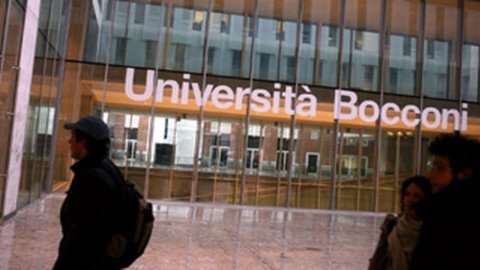The password of the new academic year of the Bocconi University of Milan is: competitiveness. First the president Mario Monti pronounces it, who as the script wants opens the works, then gradually the rector Andrea Sironi up to theguest of honour, the former Bocconi student and now CEO of Vodafone Group Vittorio Colao.
Competitiveness in education and research, to then restore competitiveness to the country and its economic system. Yes, because precisely according to Sironi "the economic dynamism that is found in areas with the highest density of young people active in research and innovation will be a decisive element in the country's recovery of competitiveness".
That's why the Bocconi is transforming itself to be more and more attractive: nn the heart of Milan, the university's urban campus is growing, one of the great innovations presented today. A 90.000 mXNUMX complex that will allow the University to satisfy the demand for services and facilities of the most demanding of the talents that the University and the city must attract in the coming years to win the challenge of competitiveness.
Though the conclusion of the works, with the completion of the former milk plant area, is scheduled for 2019, there are numerous stages of approach and each of them will contribute to the growth of Bocconi and to the architectural transformation of the district, as explained by the managing director Bruno Pavesi. "The goal - said Pavesi - is to create an avant-garde urban campus also in the areas of environmental sustainability, energy saving and optimal settlement, landscape and environmental integration into the fabric of the city and in particular of Zone 5" .
After all, it is a question of making those who are today grow over 30 students (of which 3.193 foreigners) including degree courses, masters, doctorates, MBA and SDA programs, and counting those abroad, trained by 1.377 teachers (of which 160 foreigners), and place them in an increasingly complicated job market where, as we know, the prestige of the Milanese university, among the first in the world in the official rankings, remains very high.
Indeed, in the 2012 academic year, 91,5% of graduates found a job one year after their two-year degree, 24,5% of those who, as two-year graduates, worked abroad on the day of their graduation, while the average waiting time for the first job is just 1,1 months for Bocconi students. Precisely for these reasons, students could be more and more, which is why in addition to the urban campus Bocconi's other objective is to exceed 2.000 beds for students and visiting professors, improving an already important number, such as the 1.386 beds made available today. Starting from the 2014-2015 academic year, the offer, according to what was said today, will increase by 213 places.
To attract the best international researchers and professors, Bocconi is therefore developing "an environment as favorable as possible to research, capable of stimulating the productivity of researchers who come from all over the world", as supported by the rector Sironi, who cited the growth in the number and quality of international publications by professors as proof and the fact that Bocconi is the second European university by number of ERC (European research council) funding in economics, finance and management.
Yes, because Bocconi, although a private institution, now also aims to attract young people with the best potential, regardless of any social disadvantage. For this purpose, in 2012 it provided financial aid for 22,2 million euros to over 2.000 students (15% of students enrolled) and completed 1.000 economic interventions to support international mobility.





